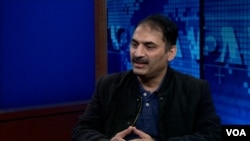Late last year, investigative journalist Ahmad Noorani published an article looking at the tax records and assets of a former Pakistan army chief.
The journalist said he uncovered alleged corruption and thought that authorities would investigate the apparent wrongdoings. But, he told VOA, “instead, they are investigating me.”
One month after his report, Pakistan’s Federal Investigation Agency filed a First Information Report — the first step in bringing legal charges — against Noorani, saying that the tax documents he reviewed in his coverage were illegally obtained.
The Pakistan army's Public Relations Department has denied the claims in Noorani’s report. And a statement that the minister of information and broadcasting shared with VOA said that “journalists are not exempt from legal obligations related to data protection and privacy.”
Noorani acknowledged that accessing tax records is not permitted but said that if someone leaks information to the media that is verified and of interest to the public, then a journalist should be free to use it.
“In Pakistan, military and intelligence officials enjoy unbridled power,” said Noorani, who is based in the U.S. He added, “This situation makes reporting on corruption a very risky assignment.”
Works in exile
Noorani published his work in FactFocus, an outlet that he runs from exile in the U.S. with a team of journalists.
The news website covers corruption, bad governance and human rights violations, mainly in Pakistan.
But even before starting FactFocus, Noorani had been reporting on organized crime, politics, corruption, fraud and human rights in Pakistan for over 15 years.
Noorani has been declared a “proclaimed offender” in the case, which means that if he surrenders, Pakistani officials can initiate a process to confiscate his properties and assets. A second journalist, a freelancer, Shahid Aslam, is also named in the case.
Describing the charges against him as baseless, Noorani said that the threat of legal action is a tactic used against media in Pakistan.
“False cases have been registered against journalists in Pakistan before, for example, if a journalist reports against a politician or a bureaucrat,” Noorani said.
“When journalists are retaliated [against] for public interest stories, they have to exercise self-censorship most of the time. This ultimately affects the quality of journalism, and in such situations, investigative journalism become[s] impossible,” Noorani said.
The case has been condemned by rights groups including the Human Rights Commission of Pakistan and the Committee to Protect Journalists or CPJ.
The rights commission said on social media that the “action was disproportionate” and it urged the High Court to grant relief.
The CPJ in its statement said the targeting “is a clear intimidation and [a] threat to press freedom.”
The statement from the Ministry of Information and Broadcasting said assertions that Noorani and Aslam were “subjected to harassment is totally uncalled for, unsubstantiated and untrue.”
The statement added that the journalists are being investigated for leaking personal data and that legal proceedings should not be characterized as harassment or intimidation.
Bribery accusation
Aslam has been accused of offering a bribe to officials to obtain the tax data. He has denied the allegation.
The Lahore-based journalist used to work for the privately owned broadcaster BOL News. But, he said, after the recent case he lost that job.
For now, the journalist said, he is working for BBC Urdu and running a YouTube channel, "Xposed with Shahid Aslam.”
The tax case has made him more cautious.
“I have stopped working on important stories,” he said. “I always fear that I may be harassed, chased, intimidated again.”
Umar Cheema, a prominent investigative reporter for the national Pakistani paper The News, said that targeting a journalist only because he or she reported about a government official doesn’t make sense.
“Pakistan has never been a safe place for practicing accountability journalism, but this shouldn’t be a reason to stop practicing journalism,” Cheema told VOA.
Matiullah Jan, a well-known journalist in Islamabad, said such cases create “a chilling effect on media and society.”
Jan, who currently broadcasts on YouTube, has been attacked, kidnapped and harassed for his work.
“When journalists are targeted due to their stories, it destroys people’s fundamental right to know and free speech,” he said. “Sources avoid giving information, journalists are scared to report it, government officials are reluctant to investigate and prosecute.”
Despite a small improvement in 2023, Pakistan ranks poorly on the World Press Freedom Index, coming in at 150th out of 180 countries, where No. 1 shows the best media environment.
In its assessment, Reporters Without Borders said any journalist who crosses red lines dictated by the intelligence agencies is “liable to be the target of in-depth surveillance that could lead to abduction and detention.”
Improvement cited
Pakistan’s Ministry of Information and Broadcasting, however, has said that the seven-point improvement on the 2023 index shows Pakistan’s “commitment to the freedom of media.”
“We believe that freedom of expression must be exercised responsibly and within the legal framework,” the statement added.
Noorani said he would fight the legal case. While he has not faced charges before, his reporting has resulted in threats and attacks.
While working as a journalist in Pakistan in October 2017, gunmen forcibly stopped his vehicle in Islamabad, dragged Noorani out of the vehicle and tortured him, he said.
But the journalist said he would still report from exile and would challenge the action against him.
“We always exercise caution and take all kinds of measures which can save us and our families from this harassment,” he said, adding that with the legal case, “we will be more cautious while performing our journalistic duties.”
The next hearing in his case is scheduled for late July.
This story originated in VOA’s Urdu Service.




